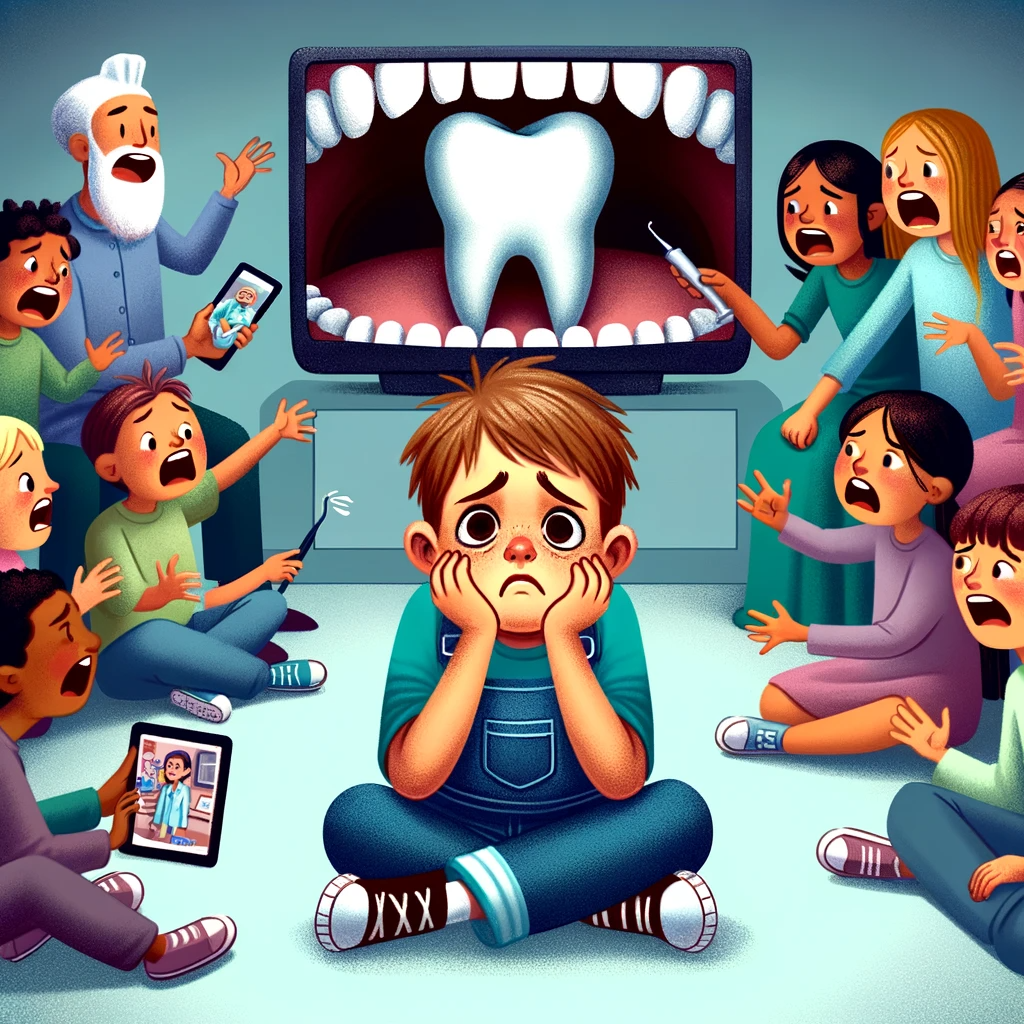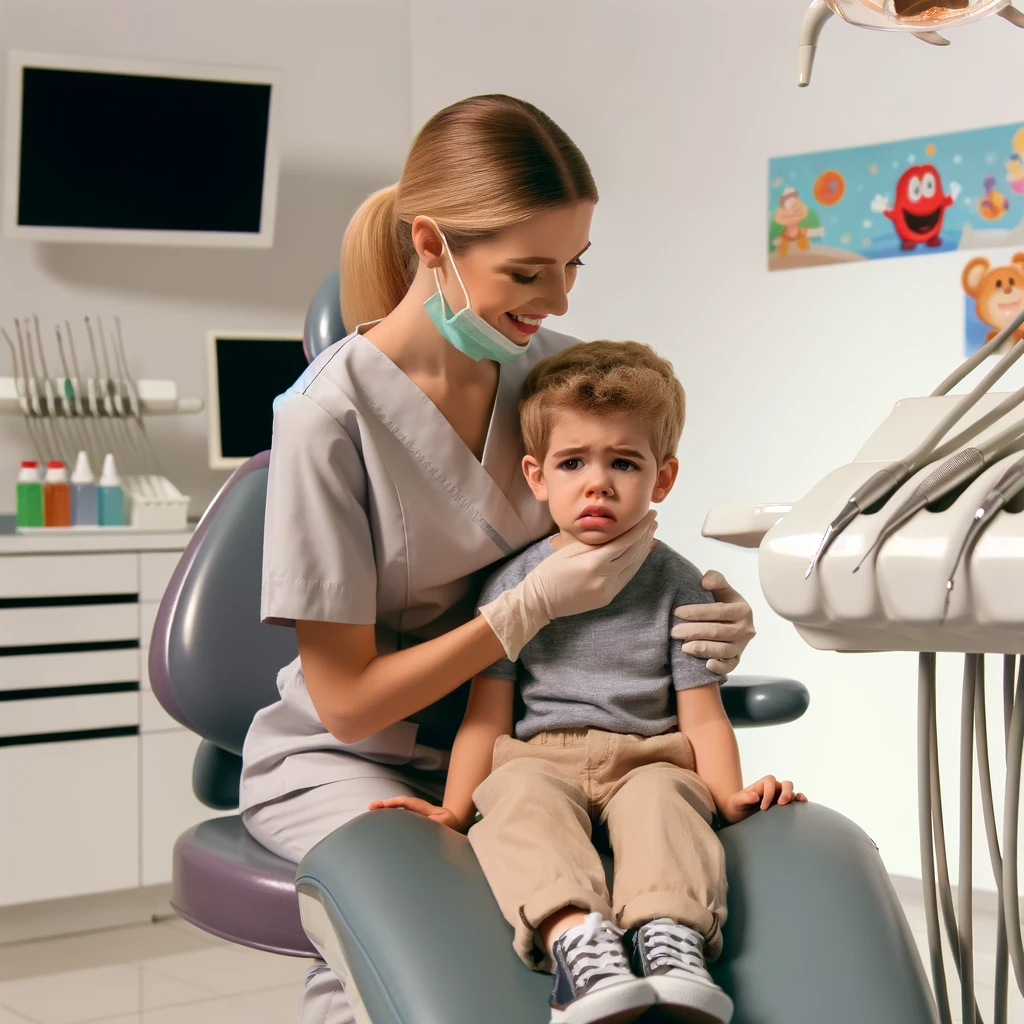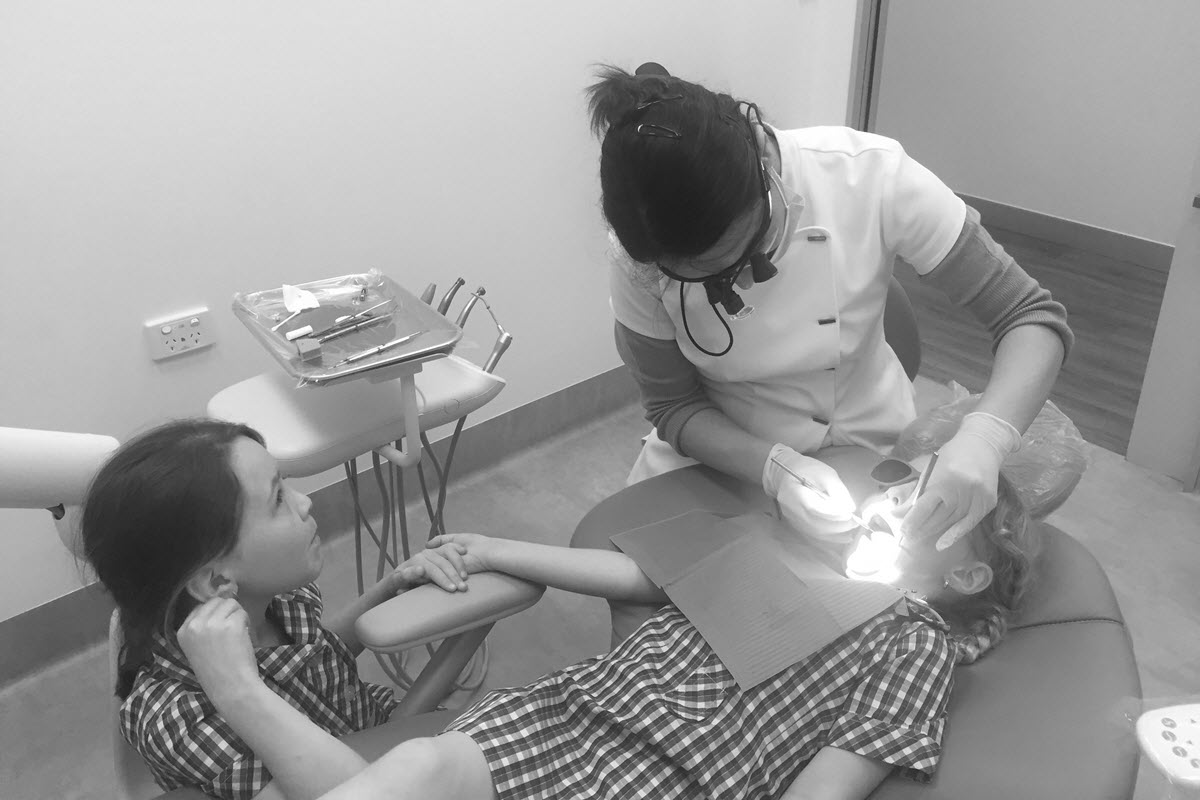Sources of Dental Fear in Children
- Unfamiliar Environment: Dental clinics, with their unique sounds, smells, and sights, can be intimidating. The sight of dental instruments, even if not harmful, can seem scary to a child.
- Anticipation of Pain: Children might associate the dentist with discomfort or pain from personal experience or hearing about others’ experiences.
- Influenced by Stories: Stories from friends, siblings, or media can shape a child’s perception of dental visits, often exaggerating the negative aspects.
What are effective methods for parents to alleviate dental anxiety in children?
Based on the information from Dr Ellie Nadian a Paediatric Dental Specialist in Brisbane, here are ways to help with dental anxiety in kids:
- Identify the Fear: Understand what specifically is causing your child’s anxiety, whether it’s fear of pain, feeling powerless, or obstructed breathing.
- Regular Dental Checkups: Familiarize your child with regular dental visits to build comfort and trust with the dental environment.
- Choose the Right Dentist: Find a dentist who is experienced in handling children, especially those with dental anxiety.
- Give Advance Notice: Prepare your child for the visit by discussing what to expect in a calm and reassuring manner.
- Be Careful with Details: Avoid sharing potentially frightening details of dental procedures.
- Set a Good Example: Demonstrate positive attitudes towards oral hygiene and dental visits.
- Promote Good Oral Hygiene at Home: Encourage daily brushing and flossing to prevent dental issues that might require more invasive treatment.
- Use Distractions: Allow your child to bring a favorite toy or book to the appointment for comfort.
Remember, the key is to create a positive and reassuring environment for your child to help alleviate their dental anxiety.
What are the common Childhood Fears in Dental Clinics?
Based on the information provided by Dr Soha Sharif, a Kids’ dentist in Brisbane that provides dental treatment specific to children, common childhood fears in dental clinics include:
- Obstructed Breathing: Difficulty breathing when the mouth is open during treatment.
- Powerlessness: Feeling out of control with someone else working in their mouth.
- Pain: Worry about pain or discomfort during dental procedures.
- Unexplained Fear: General fear of the unknown, influenced by stories or sensory issues.
Addressing these fears requires a combination of understanding, preparation, and the right dental environment to create a positive experience for children.
What are the Most Effective Strategies for Assisting Children in Overcoming Dental Anxiety?
Based on the insights from this dentist in Brisbane, the most effective strategies for assisting children in overcoming dental anxiety include:
- Identifying the Source of Fear: Understand if the anxiety is due to obstructed breathing, feeling powerless, pain, or unexplained fears.
- Regular Dental Checkups: Familiarize the child with the dental environment and routine checkups.
- Choosing the Right Dentist: Find a dentist experienced with children who can create a comfortable environment.
- Advance Notice and Communication: Inform your child about the appointment ahead of time and encourage questions to ease their anxiety.
- Be Cautious with Details: Provide information about the procedures, but avoid scary details.
- Set a Good Example: Demonstrate good oral hygiene and a relaxed attitude towards dental visits.
- Emphasize Oral Hygiene at Home: Teach and maintain good oral hygiene to prevent the need for extensive dental procedures.
These strategies aim to create a positive and less fearful experience for children during dental visits.
How do I help my child not be scared of the dentist?
To support your child in overcoming their fear of the dentist, based on insights from the Brisbane Specialist Paediatric Dental Practice:
- Prepare Them: Explain what will happen at the dentist in simple, positive terms. Stay honest and avoid creating false expectations.
- Book a Comfortable Time: Choose when your child is well-rested and not hungry.
- Stay Calm: Your calmness can greatly influence your child’s anxiety levels. Let the dental team guide your child.
- Choose the Right Dentist: Find a paediatric dentist who makes your child feel comfortable and safe.
Regular dental visits help build trust and familiarity, reducing fear over time. Remember, a positive, patient approach is key.
"Are Regular Dental Appointments Effective in Alleviating Dental Phobia in Children?
Regular dental appointments are indeed effective in alleviating dental phobia in children. These appointments help build trust between the child and the dentist, familiarize the child with the dental environment, and reduce the fear of the unknown. Children gradually become more comfortable and confident by consistently visiting the dentist from a young age, making future dental treatments less intimidating. Maintaining a positive and honest approach is important, allowing the child to feel in control and understand what to expect during each visit.
Identifying Fear in Children Regarding Dental Visits
- Observing Behaviour: Children may exhibit signs of dental anxiety, such as clinging to their parents, crying, or outright refusing to enter the dental clinic. Some might express their fear verbally, while others show it through body language like nervousness or unusually quietness.
- Changes in Routine: Notice if your child becomes more anxious or upset as the dental appointment approaches. They might have trouble sleeping or show resistance when discussing the visit.
What are the potential consequences for children's oral health when parents delay dental appointments due to anxiety or fear?
Delaying dental appointments due to a child’s fear or anxiety can have several negative consequences for their oral health:
- Increased Risk of Dental Problems: Delaying check-ups can lead to undetected dental issues, such as cavities or gum disease, which can worsen over time.
- Pain and Discomfort: Untreated dental problems often lead to pain, which can further intensify a child’s fear of dental treatments.
- Longer, More Complex Treatments: What might have been a simple treatment can become more complex if delayed, possibly requiring more invasive procedures.
- Reinforcement of Fear: Not addressing the fear early can reinforce it, making future dental visits more challenging.
Addressing dental fears early and seeking regular dental care to prevent these issues is important.
How do Paediatric Dentists Manage Situations When a Child Begins to Panic During Dental Treatments?
Paediatric dentists are specially trained to handle the unique challenges that arise when treating young patients, especially when a child begins to panic or becomes anxious during dental treatments. Their approach typically involves a combination of behavioural management techniques, communication strategies, and sometimes sedation methods to ensure a safe and calming environment for dental care.
- Preparation and Prevention: Paediatric dentists often start by preparing the child for the visit. This includes using age-appropriate language to explain procedures, offering a tour of the office, and introducing dental tools in a non-threatening way.
- Building Trust and Rapport: Establishing a trusting relationship is key. Dentists might spend extra time getting to know the child, engaging in conversation about their interests, and reassuring them through a friendly and empathetic demeanour.
- Distraction Techniques: Utilizing various distractions can be effective. This could include playing the child’s favourite music or TV shows, using toys or interactive dental tools, and employing storytelling or guided imagery to divert attention from the procedure.
- Tell-Show-Do Method: This approach involves explaining a procedure in simple terms (Tell), demonstrating it on a model or the child’s finger (Show), and then carrying out the procedure (Do). This method helps demystify treatments and reduce fear.
- Positive Reinforcement: Praising the child for good behaviour and cooperation during the visit can be encouraging. Rewards like stickers or a small toy after the appointment can also be effective.
- Parental Involvement: Involving parents in the process, either by having them present during the treatment or educating them on how to prepare and comfort their child, can significantly reduce anxiety.
- Sedation Dentistry: Paediatric dentists might consider sedation options for extreme cases of panic or lengthy procedures. This can range from mild sedatives to help relax the child to general anesthesia for more invasive procedures.
- Tailoring the Approach: Every child is unique, so paediatric dentists often tailor their approach based on the individual child’s needs, temperament, and previous dental experiences.
In summary, peadiatric dentists employ a multifaceted approach to manage and alleviate panic and anxiety in children during dental treatments, focusing on creating a positive, reassuring, and child-friendly environment.
What Can I Do if My Child is Scared of the Dentist?
Here’s what you can do if your child is scared of the dentist:
- Prepare Your Child: Explain what will happen at the dentist in simple, positive, and honest terms.
- Choose the Right Time: Schedule the appointment when your child is well-rested, either in the morning or after a nap.
- Ensure Your Child is Not Hungry: A well-fed child is likely to be more cooperative.
- Stay Calm: Your calmness as a parent can significantly influence your child’s behaviour.
- Find a Comfortable Dental Practice: Choose a child-friendly dental practice with a team experienced in handling children’s dental anxiety.
Following these steps can help your child overcome their fear and ensure they receive the dental care they need.
Is Dental Sedation a Safe Option for My Child's Dental Procedures?
Based on the information from Brisbane Sleep Dental Clinic, sleep dentistry is generally a safe option for children undergoing dental procedures. Here are some key points:
- Types of Sedation: Includes nitrous oxide (laughing gas), oral sedation, IV sedation, and general anesthesia. Each type has specific applications and safety profiles.
- Nitrous Oxide: Commonly used, it’s a mild sedative with few side effects. It helps children relax without causing deep sleep.
- Safety Measures: Dental professionals take numerous precautions to ensure safety during sedation. These include monitoring vital signs and using the appropriate sedation level for the procedure and the child’s health.
- Parental Involvement: Parents can help prepare their child by explaining the procedure in simple terms and being present during the treatment for reassurance.
- Aftercare: Post-sedation, children may be groggy or nauseous. Following the dentist’s aftercare instructions is important for recovery.
Always consult with your pediatric dentist to determine the best and safest sedation option for your child, considering their specific needs and health history.

Understanding Your Child’s Reluctance
- Recognise the Fear: It’s normal for children to feel anxious or scared about dental visits. This fear can stem from the unfamiliar environment, fear of pain, or stories they might have heard.
- Empathise and Reassure: Show empathy towards your child’s feelings. Let them know that it’s okay to feel scared and that you’re there to support them.
You can find more information in this article about nervous children who are runners and won’t let dentists near their mouths.
Strategies for Handling Dental Care Reluctance in Children
- Start Early: Familiarise your child with the concept of dental health from a young age. Read books about dentistry, play ‘dentist’ games, and discuss the importance of healthy teeth.
- Choose the Right Dentist: A paediatric dentist specialises in treating children and is trained to create a friendly, comforting environment.
- Visit the Clinic Beforehand: If possible, visit the dental clinic for a non-treatment visit. Let your child meet the dentist and get used to the surroundings.
- Use Positive Language: Avoid using words like ‘pain’ or ‘shot’. Instead, paediatric dentists often use terms like ‘sleepy juice’ or ‘magic air’ to describe anaesthetics.
- Reward and Encourage: Positive reinforcement can be very effective. Plan a fun activity after the dentist visit or a small reward for bravery.
Nervous Children Dental Treatment Options in Brisbane
- General Anaesthesia (Sleep Dentistry for Children): General anaesthesia is an option for extremely anxious children or those needing extensive treatment. It allows the paediatric dentist to work efficiently while the child is asleep. This is usually done in a hospital setting and requires assessment by a paediatric anaesthetist.
- Relative Anaesthesia (Laughing Gas for Children): Nitrous oxide, commonly known as laughing gas, is a mild sedative that helps relax children during dental procedures. It’s safe and wears off quickly after the treatment.
- Behaviour Management Techniques: Paediatric dentists are trained in various techniques to gently guide a child through dental procedures, making them feel at ease.
- Desensitisation: Gradually introducing the child to dental procedures, starting with simpler and non-invasive procedures, can help reduce anxiety over time.

How Can Parents Reassure Children with Dental Anxiety
Based on the information from the International Association of Paediatric Dentistry (IAPD), here’s how parents can empathise and reassure their children about dental visits:
- Recognise and Acknowledge Fear: Understand that fear of the dentist is common in children. Validate their feelings by acknowledging that it’s okay to be scared.
- Communicate Openly: Talk to your child about what to expect at the dentist simply and positively. Avoid using negative words or expressions that might increase their anxiety.
- Model Positive Behaviour: Children often mirror their parents’ emotions. Showing calmness and a positive attitude towards dental health can help ease their fear.
- Familiarise with the Dental Environment: If possible, visit the dental clinic for a non-treatment visit. Allow your child to meet the dentist and staff in a non-threatening environment.
- Use Resources: Utilise children’s books or online resources that positively portray dental visits. This can help demystify the experience for your child.
- Stay Supportive: During the visit, stay close to provide comfort. Your presence can be very reassuring for your child.
Remember, the goal is to create a positive and trusting relationship with dental care from a young age, which is crucial for lifelong oral health. The approach should always be gentle, patient, and understanding.

What to do if your Child won’t Tolerate Dental Treatment
According to Dr Roya Moulavi, an experienced dentist in Perth, here’s what to do if your child won’t tolerate dental treatment:
- Delay Treatment: For minor issues, treatment can be delayed. Ensure good oral hygiene and diet control during this period.
- Happy Gas (Nitrous Oxide): This safe option reduces dental anxiety. It’s effective for short procedures but requires the child to cooperate with wearing a mask. See kids’ dental treatment using laughing gas by Brisbane Kids Dentist.
- General Anaesthetic (GA): Used when extensive or urgent dental work is needed. The child is put to sleep, and all dental work is completed in one visit. See kids’ dental treatment using general anaesthesia by Brisbane Kids Dentist.
Following up with regular dental check-ups and maintaining good oral hygiene after treatment is important. These approaches aim to create positive dental experiences for the child, gradually building their comfort and cooperation with dental procedures.
Remember, every child is different, and what works for one may not work for another. It’s about finding the right approach and dentist for your child. As a parent, your calm and reassuring presence is vital. Let your child know that the dentist is a friend who will help keep their teeth healthy and strong.
If you’re in Brisbane, you’ll find that paediatric dentists are well-equipped to handle children who are ‘absolute runners’. They create a child-friendly environment and employ strategies tailored to each child’s needs, ensuring a positive dental experience.
Understanding, patience, and finding the right specialist paediatric dentist are key to managing a child’s reluctance to dental procedures. You can turn a potentially stressful situation into a positive step towards lifelong dental health with the right approach.